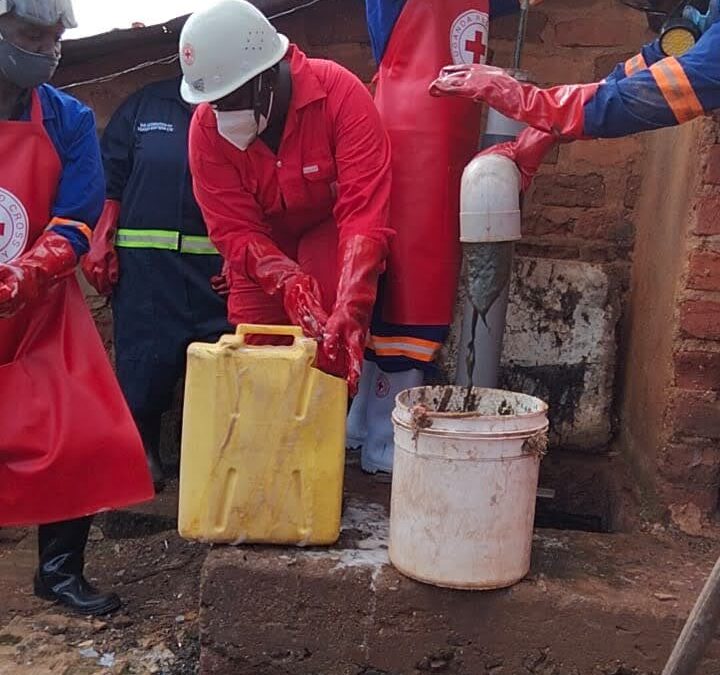Written by: Maureen Nabuduwa, Branch Manager at Uganda Red Cross Society Kampala South Branch | Jan 31, 2024
Background
Every onset of the rainy season is a cause of fear for slum dwellers in Makindye East which hosts the biggest number of informal settlements in Kampala with an estimated population of 409,500 people, a large number of which lives in abject poverty. People living in this area are faced with a major challenge of improper waste (faecal) disposal due to inadequate number of toilets, lack of access to latrines because they are filled up and no longer in use, and open defection. Most households as a result of not having access to latrines, resort to open defecation and or defecating in polythene bags and throwing faeces in drainage channels (flying toilets) a practice that endangers their lives as it could lead to disease outbreak e.t. cholera, typhoid etc. Due to the poor waste disposal and management, drainage systems often get blocked leading to flooding and as a result, many slum dwellers are left homeless with lots of properties lost.
Through the Skybird project URCS Kampala South Branch undertook hygiene and sanitation intervention by supporting 3 women groups of 45 members (Kabalagala, Kibuli, and Bukasa) to establish waste management enterprises (waste-preneurship) providing services of gulping (toilet emptying). This case study outlines the process, successes and challenges related to this activity from the implemented Skybird micro project.
Details of the project
Identification, selection and formation of wasteprenuership groups
Three (3) wasteprenuership groups from Kibuli, Bukasa and Kabalagala were formed with the help of Local Council leaders. Each parish formed a group comprising of 10 – 15 members. The members of these groups fit the selection criteria, i.e. are within the ages of 19 to 45 (although in some parishes, have at least one or two members who are above the age), single mothers, Persons with Disabilities, unemployed youths who head homes, among others.
Gulping Consultancy
Two (2) consultative meetings were held with Scoup fit sanitary services. The chairperson gulpers association was also consulted by the Branch Manager during the planning of gulpers training.
Gulper Training
Three (3) wasteprenuership groups selected and formed in Kibuli, Bukasa and Kabalagala were equipped in gulping and business skills in a 4-day training held at Kabalagala Youth one-stop centre. 45 participants attended the training. Of these 13 were males and 32 were females.
Procurement of gulping kits
The branch procured gulping kits to be distributed to the wasteprenuership groups. These include gulpers, protective equipment, containers, among others. Tricycles were also procured centrally to complete the kit for distribution. These items however have not yet been distributed.


The Gulping Process
- Survey of the latrine / toilet is done
- Donning of protective gear
- A mixture of detergent and water is poured in the latrine to reduce the smell.
- Gulper technician inserts a metallic hook in the latrine to remove any rubbish or foreign material
- Gulper is then inserted and pumping of feacal sludge is done.
- The sludge is collected in a small container for easy transportation and emptied in a larger barrel.
- Once the process is done, the gulper technicians repair the toilet if there is need, clean any sludge around the toilet.
- Cleaning of tools and equipment is done. The waste is then transported to the disposal plant in Lubigi.




Impact
- Improved sanitation and hygiene. The wasteprenuership groups support the sanitation aspects in slums within Kampala.
- Created employment opportunities for youth e.g. In Bukasa 4 youths (2 females 2 males)
- Profits have been realized in the business
- Created a savings group
- Increased standard of living of group members (earn a commission on the job).
- Increased access to sanitation facilities
- Access to raw material (polythene used to make slabs)
- Creation of partnerships and linkages
- Formally registered companies
Monitoring / evaluation
The monitoring was done by the members of the board, who were present during the GULPING trainings as well as the ADA field visit. Monitoring and support supervision was also carried out by the SKYBIRD team from the Head office to provide technical guidance.
Cooperation/networking
During the implementation of the project, the branch worked closely with local leaders at all levels. That is village, parish and Division level. For technical support, the branch worked with the Kampala City Council, Uganda Gulper’s association and Scoup fit sanitation solutions.
Challenges and Recommendations
- High costs of gulping (30,000/= per barrel)
- Competition from other service providers. It is important to provide quality services in order to have an edge over your competitors. Collaboration with competitors can keep you relevant in the business.
- Structural problems (the holes are small so they end up incurring costs to rebuild.
- Mechanical breakdown of machinery and equipment
- Financial literacy is important in business operations
